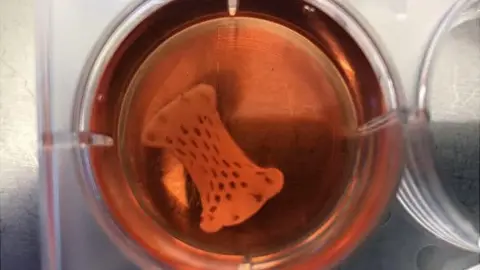'Pumping heart patch' ready for human use
A "pumping" patch containing millions of living, beating stem cells could help repair the damage caused by a heart attack, according to researchers.
Sewn on to the heart, the 3cm (1in) by 2cm patch, grown in a lab from a sample of the patient's own cells, then turns itself into healthy working muscle.
It also releases chemicals that repair and regenerate existing heart cells.
Tests in rabbits show it appears safe, Imperial College London experts told a leading heart conference in Manchester.
Patient trials should start in the next two years, the British Cardiovascular Society meeting heard.
A heart attack happens when a clogged artery blocks blood flow to the heart muscle, starving it of oxygen and nutrients.
This can damage the heart's pumping power and lead to incurable heart failure.
Heart failure affects about 920,000 people in the UK.
 Prof Sian Harding, Imperial College London
Prof Sian Harding, Imperial College LondonResearcher Dr Richard Jabbour said: "One day, we hope to add heart patches to the treatments that doctors can routinely offer people after a heart attack.
"We could prescribe one of these patches alongside medicines for someone with heart failure, which you could take from a shelf and implant straight in to a person."
Prof Metin Avkiran, from the British Heart Foundation, which funded the research, said: "Heart failure is a debilitating and life-changing condition with no cure, making everyday tasks incredibly difficult.
"If we can patch the heart up and help it heal, we could transform the outlook for these people."
